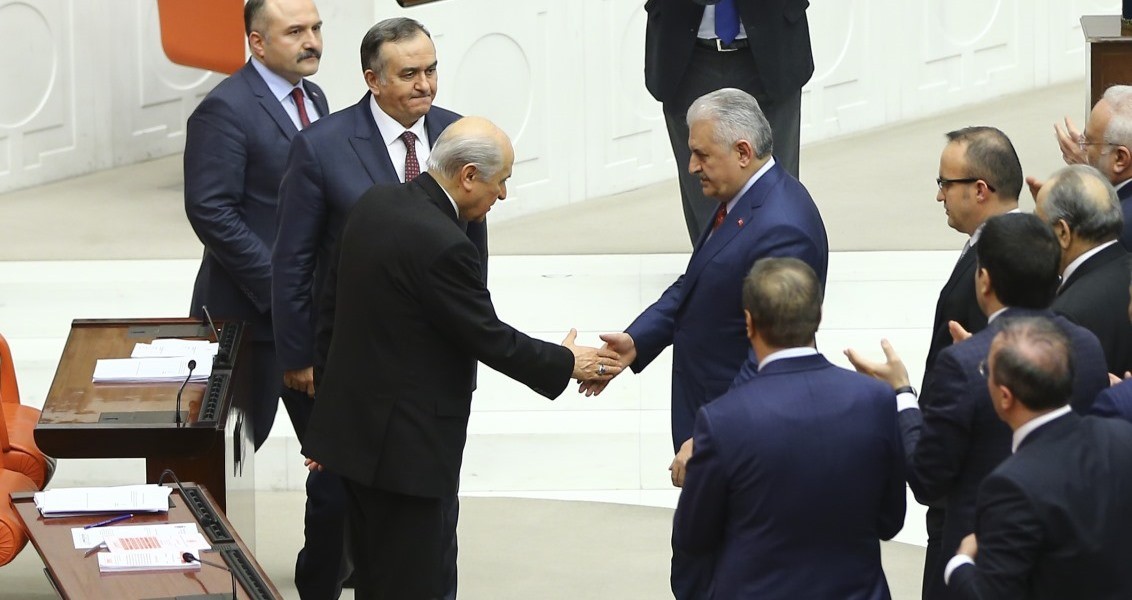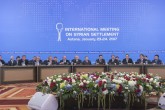A historic referendum will be held in Turkey to address problems with the country’s current system of government. While the constitutional reform bill received the support of the Justice and Development Party (AK Party) and the Nationalist Movement Party (MHP) in Parliament, the Turkish people will have the final say. As such, the upcoming referendum represents the single greatest decision made by civilians about their country’s system of government.
Over the next few months, there will be no shortage of disagreements, fierce competition, and campaign events. Judging by the level of tensions during the parliamentary debate, crowds will be energized and extremely loud.
However, it is absolutely crucial for all parties to respect Turkey’s democratic credentials on the campaign trail. After all, we will not just be making a decision on proposed changes to the Constitution. We will also be looking for ways to handle the chaos that an emerging world order entails.
With President Donald Trump in the White House, chaos in Turkey’s surrounding area will presumably become more serious and assume a global character. In this sense, the need for effective and strong states is becoming a global phenomenon and not just a regional necessity.
President Donald Trump made it perfectly clear to the world during his inauguration that his campaign slogan “America First” will set the framework for his administration’s actions. At this time, there is no doubt that the American elites are engaging in serious questioning of their country’s fate, values and worldview. Some people believe that Trump’s election victory marked the death of liberalism, which is why the Western media desperately highlights the importance of institutions such as the United Nations despite their shortcomings.
At the same time, the fear, anxiety, and bitterness felt by Washington’s liberal elite is keeping Europe’s leaders awake at night. One way or another, they will have to redefine NATO and the European Union, among other organizations. As a matter of fact, many Europeans understand that the U.S.-centered post-World War II order, which underwent limited changes after the Cold War, will be replaced with something new.
Although the U.S. will remain the most prominent power in the world, Washington’s priorities will change. At this time, there is a growing sense among Americans that their country’s global responsibilities are becoming less important and that the incoming administration should create a new global balance of power by using its military and economic power while protecting American interests.
In this sense, the U.S. could use economic incentives and disincentives as a weapon, just as it could use actual weapons to further economic interests.
The phenomenon of right-wing populism, which rose to power in the United States, is also banging on Europe’s doors. Even though far-right parties cannot actually win elections in the old continent, the political center will find it increasingly difficult to weather the storm.
Consequently, the emerging populist wave will likely result in resistance, chaos and the pursuit of a new order against the backdrop of fierce competition between the U.S., China and Russia and their attempts to create a new balance of power and redefine their spheres of influence.
But the ultimate question is how the competition between central players will influence the Middle East. At a time when the region suffers from problems associated with failed states, some people dream of Balkanization.
President Recep Tayyip Erdoğan issued a serious warning before leaving for official visits to Tanzania, Mozambique and Madagascar on Sunday saying, “We hear certain statements about the Middle East, which, frankly, are quite disturbing. We support [a regional order] where the territorial integrity [of all countries] is respected. We absolutely do not dream of a disintegrated Middle East and it would be wrong to do so. First and foremost, it would be disrespectful to the people of the Middle East.”
The Trump administration’s Middle East policy runs the risk of aggravating the existing chaos in the region. Under the current circumstances, countries without serious domestic problems stand to benefit from the wind of change. If Turkey successfully reforms its system of government, it could manage the chaos better than any other country.
[Daily Sabah, January 26, 2017]
In this article
- Domestic Policy
- Foreign Policy
- Opinion
- 2017
- China
- Cold War
- Constitutional Reform
- Daily Sabah
- Domestic Policy
- Donald Trump
- Elections
- Europe
- European Union (EU)
- Far-Right
- Middle East
- NATO
- Recep Tayyip Erdoğan
- Russia
- Terror
- The President of the Republic of Türkiye
- Trump Administration
- Turkish Foreign Policy
- Turkish President
- Turkish-American Relations
- Türkiye-US Relations
- Türkiye's Justice and Development Party | AK Party (AK Parti)
- Türkiye’s Nationalist Movement Party (MHP)
- United Nations (UN)
- United States (US)
- Western Media
- Western World



